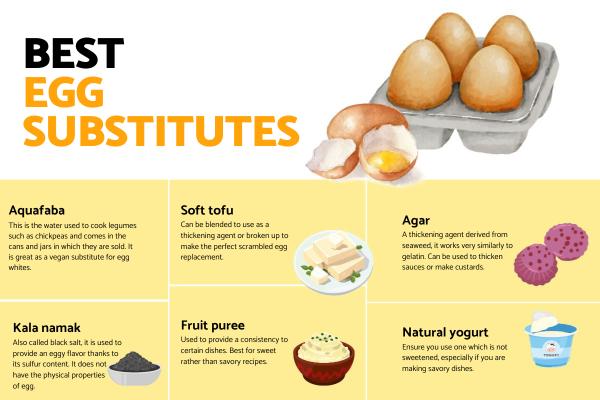
When consumed as food, eggs are used in various ways. Some recipes use them as a binding agent, others as emulsifiers. They can add high-quality protein to the diet, as well as other nutrients. Many of the most famous dishes use egg, some of which we may not be aware use this ingredient in the first place. In addition to being used in a wide variety of savory and sweet dishes, we can also enjoy eggs on their own whether boiled, scrambled, poached or fried. Unfortunately, this ubiquity can be a great challenge for those of us who either can't eat eggs due to an allergy or who refuse to eat them because of their dietary choices.
For this reason, oneHOWTO asks what are the best egg substitutes for vegans and egg allergies? Some of the best egg replacements in recipes include aquafaba, Himalayan black salt, soft tofu, flax seeds or chia seeds.
Aquafaba
When you cook legumes in water, the water becomes infused with properties from the food. This water is known as aquafaba and can be found in cans and jars of legumes such as beans, lentils and chickpeas. When used as an egg substitute, they most often are used to mimic the properties of egg whites. They can be used in omelets, cakes, pancakes or meringues.
This vegan egg substitute contains properties that can be used for the following purposes:
- Thickeners
- Emulsifiers
- Cocktails
- Binders
- Gelatinizing agents
See how you can use chickpeas to make health snacks at home with our related guide.
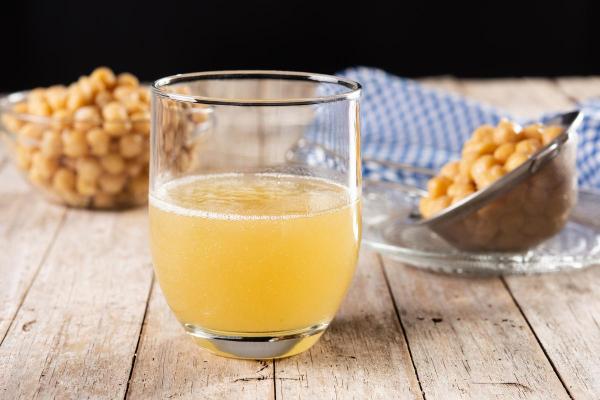
Himalayan black salt
Aquafaba is used as an egg white substitute to mimic the physical properties of eggs. Himalayan black salt is used to mimic the flavor of eggs. This version of Himalayan salt is called kala namak or simply black salt. Its mineral composition is similar to those of eggs because it contains sulfur, iron and magnesium. Sulfur especially provides that very ‘eggy’ smell.
If you add a pinch of Himalayan black salt to a dish, it will provide an egg flavoring which is hard to find elsewhere. You can use it to season season vegan toast, salads or sauces. If you can eat egg, it can also be used in scrambled eggs and omelets to complement these flavors. In any case, it's best to add it at the end of cooking.
Himalayan salt is not only used in cooking. Learn more with our article on how to make a salt volcano.
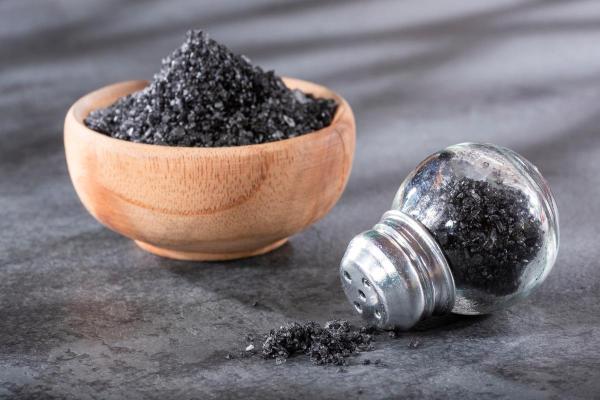
Soft tofu
Also known as silken tofu or smooth tofu, you can blend soft tofu to make sauces, creams and deserts. This provides a creamy consistency which mimics the emulsifying properties of egg. It's ideal for making vegan scrambled eggs if it is broken up into curds. This is probably the best scrambled egg substitute for vegans.
Soft tofu also provides very important nutrients because it is rich in proteins, minerals such as phosphorus, selenium and manganese. It also contains all essential amino acids. It absorbs flavor very well, so it is great with hot sauces.
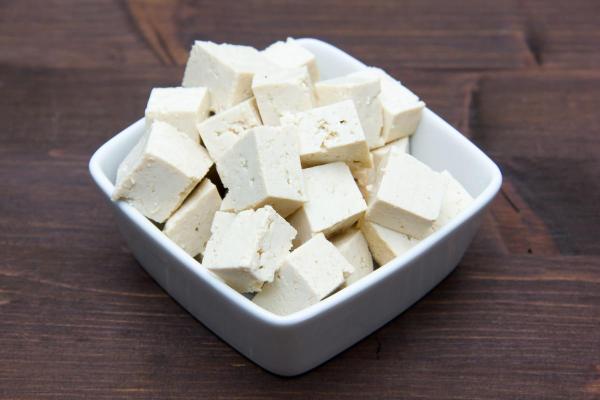
Flax or chia seeds
These small, but nutritious seeds are rich in fiber and omega-3 fatty acids. If you opt for this egg substitute, we recommend grinding flaxseed or chia seeds. You can also buy them in flour form. To make them useful, blend 7 grams of these seeds (one tablespoon) per three tablespoons of water. This is a ratio of 1:3 tbsp of seeds to water.
This mixture of flax or chia seeds with water is a perfect example of an egg substitute in the kitchen. It provides baked goods more density and weight, also giving them a nutty touch.
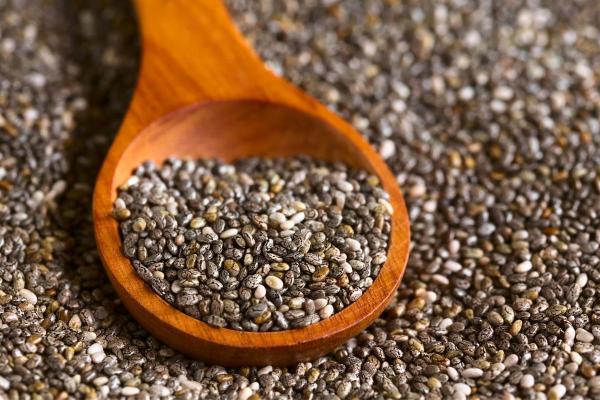
Fruit puree
A quarter of a cup of mashed banana or applesauce can be used as a substitute for an egg and is ideal for baking. Steaming apples is ideal as it provides the best consistency, but has a slightly more neutral flavor. Other pureed fruits such as avocado and pumpkin are also useful and affect the flavor less than the previous options, making them other examples of egg substitutes in baking.
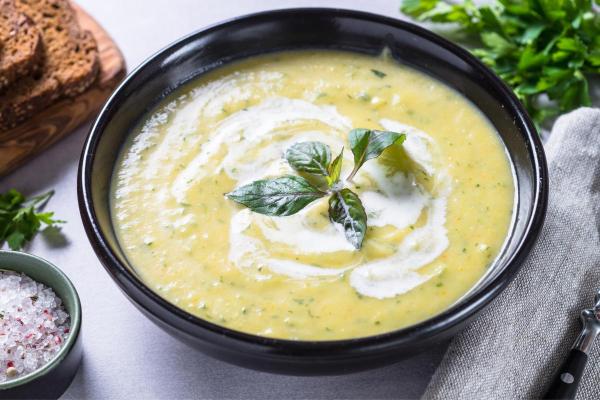
Agar
Also known as agar-agar, agar is a vegetable gelatin derived from a seaweed of the same name. It is used to thicken liquids to give them more body. You can combine 9 grams of agar-agar with water (about 15 milliliters) to replace the egg as a thickening agent. Non-vegetarians can also use animal gelatin.
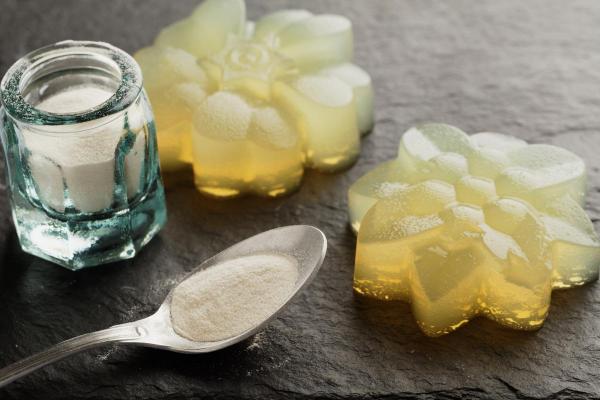
Water and flour
The resulting mixture of one part flour and one part water equals one egg. It can be wheat flour or gluten-free flours made from rice, chickpeas or corn. This preparation is used to make breaded and battered products without adding egg. Another example of egg substitutes in the kitchen.
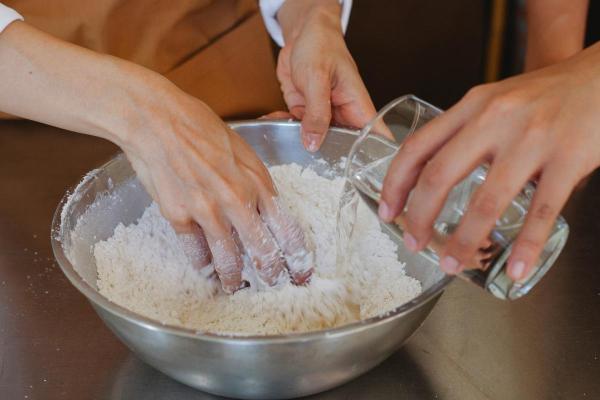
Nut butters
Almond, walnut or peanut butter are ideal for replacing eggs in baking recipes. Just 3 tablespoons are enough as an alternative to an egg. Choose varieties that are creamy rather than thick or with crunchy bits.
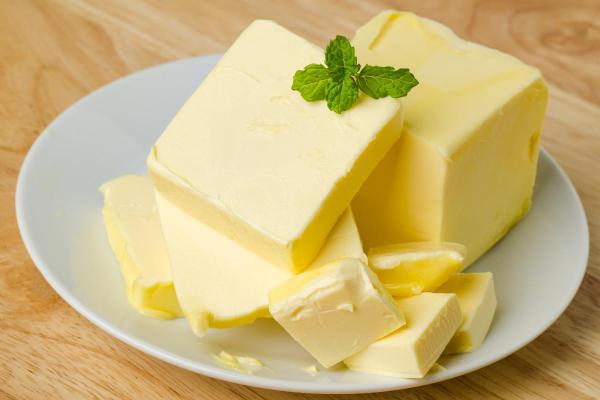
Vinegar and baking soda
It's best to use apple cider vinegar or white distilled vinegar. Just 15 grams of vinegar (one tablespoon) and 7 grams of baking soda (1 tablespoon) are very useful in replacing an egg in many dishes. Thanks to its chemical reaction, baked goods are light and airy. You can use this mix to make muffins, bread or cakes.

Natural yogurt
You can choose natural yogurt or, if you're vegan, one made from plant-based milk. Try to choose an unsweetened variety, especially if using this egg substitute in a savory dish. Keep in mind that 60 grams of yogurt is equivalent to one egg.
Chickpea flour
This is a good alternative for preparing a vegan potato rosti or hashbrown. Replace the egg by mixing one tablespoon of chickpea flour with two tablespoons of water or any plant-based drink and a little lemon juice. Other options include tapioca or corn flour.
Soy lecithin
This is a healthy vegetable fat obtained from soybeans, as a byproduct of their oil. You can find it in powder form. To replace eggs, you can add a 14-gram tablespoon of soy lecithin to your recipe.
Beer tempura
If you want a good egg substitute for batter, beer tempura is an interesting option. You only need 200 ml of beer and 300 g of corn, wheat or chickpea flour. If the mixture seems too runny when blended, add a little more flour. If the result is too thick, add more beer. The procedure for making this tempura is very easy. Simply pour the beer over the flour and beat constantly. Ensure the beer is vegan friendly as not all are.
If you want an egg-free recipe to try out these egg substitutes, try checking out our recipe for egg-free crepes.
If you want to read similar articles to What Are the Best Egg Substitutes for Vegans and Egg Allergies?, we recommend you visit our Food & drink category.